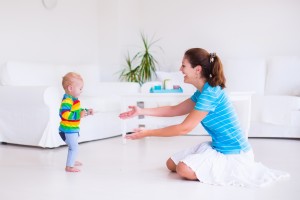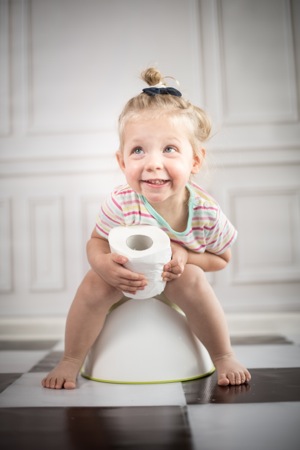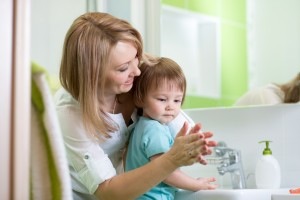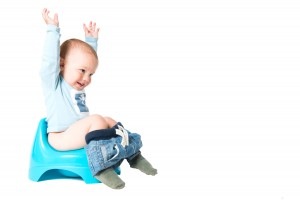
By Shilpa Vernekar, M.D.
If you are a parent, you can most likely relate to the unparalleled feeling of elation and excitement that comes when your child reaches a big milestone. In the early years, those major accomplishments may seem minor to the outside world, such as baby’s first words, baby’s first steps, and baby’s first poopy in the potty, but as a parent you alone are enchanted and just so proud of your little one. As both a pediatrician and a mother, I get it. I will never forget the first time my child said “mama,” and I celebrate with countless other parents every day over their children’s achievements.
However, it is important to first understand that potty training – like most processes with children—may or may not be easy or come naturally for you and your child. Although a bowel movement on the potty sounds so simple to you as an adult, it is important to understand that it may take time, understanding and patience on your end. Please know that you are not alone! As your child’s pediatrician, I am here to help if needed at any point along your journey of potty training. And one day, I assure you, that child who is still using his/her diaper, will be independently using the toilet thanks to your hard work and dedication!
So, let’s start at the beginning, and I will answer the most common potty training questions that parents ask in my office.
When is the right time to start potty training?
 Potty training can start anywhere as early as 6 months to when the child is 2-3 years of age. Each child is different, and you know your child better than anyone else.
Potty training can start anywhere as early as 6 months to when the child is 2-3 years of age. Each child is different, and you know your child better than anyone else.
He will show signs of being ready like informing you every time he has to do stools or pass urine. Parents can also identify that it may be time to begin potty training based upon the child’s body language. When children are about to pass stools or urine, they often change facial expressions, squirm, and/or cross their legs.
Also, prior to removing the diaper, it helps to know if your child can understand instructions or be able to rush himself to the potty if needed.
My child is ready for potty training. So, how do I start?
First, invest in a potty training device which can be purchased from any store for as low as $15-20. Next, allow your child to become familiar with the potty and ensure that the child is comfortable when he sits on the potty with his feet resting firmly on the floor. Let the child know that every time the child needs to use the potty, he needs to sit on the potty chair. The child can wear a diaper to pass stools or urine while sitting on the potty, but it is best done without the diaper. Therefore, the child can help undress and remove the pull ups before he sits on the potty.
Another strategy is to allow the child to sit on the potty every 2-3 hours to help void urine. If there is a specific time during the day that the child passes stools, then allowing the child to be on the potty at that time will help reinforce the behavior. Stickers and reward charts help older children to become potty trained.
 Additionally, wiping from front to back is important, especially for girls, to prevent urinary tract infection. This is something that seems natural, so parents may forget to teach, but it is vitally important.
Additionally, wiping from front to back is important, especially for girls, to prevent urinary tract infection. This is something that seems natural, so parents may forget to teach, but it is vitally important.
Finally, hand hygiene is important after using the potty. Parents should make it a habit that the child washes his hands each and every time after he uses the potty.
The parent should be patient with the whole process and understand that it may take 2 weeks to 2 months depending upon the child’s level of maturity. If you have tried for 1-2 weeks and feel your child is not ready, do not force the child. It will make the situation worse and make potty training even more difficult. Let the child grow, and try again few weeks or few months later.
While day time training and stool training happens in the first three months, bed wetting or being dry by night might take longer. Sometimes the child might continue to bed wet until five years of age or longer if there is family history of bed wetting. For further information of nocturnal enuresis or bedwetting, refer to this article.
When should I ask my child’s pediatrician to help with potty training?
If you child is unable to potty train by 3-4 years of age during the day or a previously potty trained child is now reverting back to passing stools/urine in the underwear on a routine basis, then it is time to visit your pediatrician.
But, remember it is normal to have some accidents at times, especially if the child is in an unfamiliar setting or with different care giver. Do not worry about it unless it happens on a daily basis.
For additional questions, please consult your child’s pediatrician. And remember: Stay calm and keep persevering: potty training will occur eventually.

Dr. Vernekar, M.D., F.A.A.P. is a board-certified pediatrician who works at Preferred Medical Group, which has locations at Phenix City Children’s, Fort Mitchell Clinic and Opelika Pediatrics and Family Clinic. Her special areas of interest include weight management and nutrition.
This post was originally published on Preferred Medical Group. Follow Dr. V. on Twitter at: www.twitter.com/shilpavernekar.


